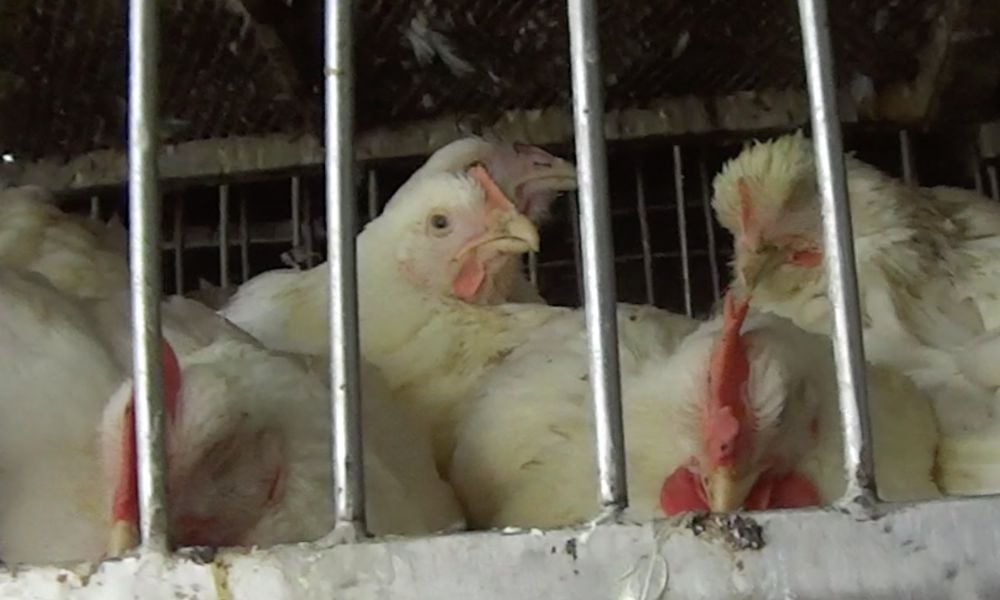Numerous live animal markets in New York — including those recently investigated by Lady Freethinker (LFT) — have histories of violating minimum state standards, for issues including roaches, overcrowding birds in filthy cages, and accumulated blood and feces, public records show.
Live animal markets, also known as “wet markets,” are facilities where customers choose which live animals they want butchered on-site. Earlier this year, our undercover investigator visited 20 live markets in New York and New Jersey and found horrific conditions at every single one — including dead animals in cages with live ones, employees yanking chickens out of cages by their feet or wings, animals with minimal and dirty food and water, and surfaces covered with blood, excrement, and bodily fluids.
We’ve now received more than 200 pages of inspection reports from the New York Department of Agriculture and Markets that reveal critical and repeat deficiencies identified by state inspectors at six of the New York live markets LFT investigated and two additional markets nearby.
From 2018 onward, inspectors noted birds kept in feces-encrusted and roach-infested holding areas, overcrowded cages, and — at one facility — live birds housed in transport cages in violation of state guidelines. They also documented human health and safety issues, including foul odors reportedly causing quality of life issues for nearby residents and workers who didn’t always follow the state’s COVID-19 guidance or have access to working sinks or hand soap, according to the documents.
The eight facilities that state inspectors noted as having repeat deficiencies are Astoria Live Poultry & Meat in Astoria; Bronx River Live Poultry, Salahi Live Poultry, and Macca Live Poultry, all in the Bronx; Halal Live Poultry in Long Island City; HK Live Poultry and Canola Live Poultry, both in Brooklyn; and P+M Live Poultry in Flushing.
Only Astoria Live Poultry responded to media inquiries from Lady Freethinker.
“I corrected the issues,” the facility’s manager Rohmon Abdul told LFT. “Everything was done. It is all in order. We have a safety plan in place, and everything is working.”
The other facilities did not respond to media inquiries, declined to comment, or did not have a manager or owner available to speak to the documented sanitation issues.
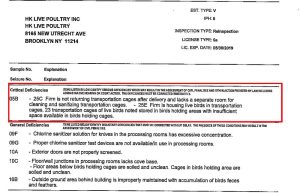
(Documents from New York Department of Agriculture and Markets)
Community Complaints of Lowered Quality of Life From “Foul” Live Markets
The complaint alleged a “pool of blood, body parts, feces, gloves and other waste” was littering the sidewalk outside of P&M Live Poultry and causing health hazards for the surrounding community.
“One can see a car parked directly on the blood,” the complainant alleged. “Wherever the car goes, they will track said excrement with them, causing additional health hazards everywhere they go. Markets like these routinely cause unsanitary conditions on public sidewalks/streets, which pose a considerable health risk. Your action to end these practices is very much needed.”
A state inspector who visited the market in February 2021 reported accumulated animal waste — including feathers, feces, and plastic trash — outside on a sidewalk and curb, as well as catch pans with accumulated excrement inside the facility. Management was advised to clean up their operations, according to the public records documents.
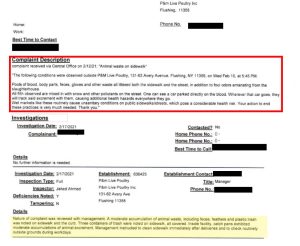
(Documents from New York Department of Agriculture and Markets)
Another complaint to state inspectors this August alleged an “extremely foul” odor was coming from Halal Live Poultry. The state inspector who followed up reported “a strong foul odor” smellable at least 200 feet away from the facility, which the report noted was in a “very residential area.”
“Although the condition was acceptable, strong foul odor was eminating (sic) from cages,” the report states. “Management was advised to increase sanitation procedures during the business hours and to utilize more cleaning solutions in order to minimize smell in the area.”
Less than a month later, another complaint alleged foul odors causing quality of life issues at the same facility, according to public records documents.
At HK Live Poultry, inspectors noted live flies and a backyard refuse dumpster that was “soiled, giving off odor, and not removed at sufficient intervals” in 2018. A consumer complaint about an allegedly foul-smelling chicken purchase brought inspectors back in October 2020, when they noted soiled floors and walls, accumulated old feces, and refuse containers again “not removed at sufficient intervals,” according to public records documents.
At Astoria Live Poultry and Meat, state inspectors noted a dumpster with a hole that was “leaking an unknown liquid” onto the sidewalk and curb in November 2021. The dumpster made another appearance in January 2022, when inspectors noted the “dumpster is leaking profusely” — along with improper storage of equipment, stagnant water, loose birds, soiled walls, and a build up of food residues and dark stains, according to inspection reports.
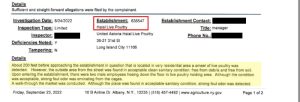
(Documents from New York Department of Agriculture and Markets)
“Critical” Violations of State Sanitation Guidelines
State inspectors cited seven of the New York live markets for “critical” deficiencies – the agency’s most serious designation. Three markets also have been fined for unsanitary conditions.
State inspectors noted critical deficiencies across seven site inspections at HK Live Poultry from 2018 through 2022 that included equipment with buildups of dark, encrusted residues and “dark grime” across food contact surfaces, live flies, and housing birds in transportation crates. Critical deficiencies this year, across three inspections, included employees coming from the kill and evisceration rooms resuming food processing activities “without washing hands and changing gloves,” bleeding cones with dried-up residues, raw animal products stored at room temperature, no knife sterilization or disinfecting system in the evisceration room, and 30 to 50 mouse droppings, according to the public records documents.
At P+M Live Poultry, state inspectors noted critical deficiencies across three inspections that included a lack of knife sterilization or a disinfecting system in the evisceration room, up to 70 old mouse droppings, and a non-operating hand wash sink.
Canola Live Poultry also had critical deficiencies noted at a July 2022 inspection that included live roaches documented near the front entrance, office, eviscerating room, picking area and outdoor storage area and a buildup of dark, dried residues across food contact surfaces.
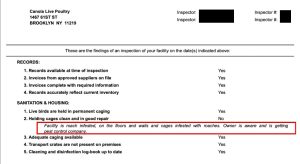
(Documents from New York Department of Agriculture and Markets)
The state fined Canola Live Poultry for unsanitary conditions in 2020, P&M Live Poultry in 2022, and HK Live Poultry twice — in 2018 and 2022. Each fine was $600, according to penalty notifications included in the public records documents.
Inspectors also noted critical deficiencies including live roaches and accumulated grime across food contact surfaces at Halal Live Poultry; improperly stored transportation crates and dysfunctional sinks at Salahi Live Poultry; and wastewater backing up into live bird cages from a floor drain in the refuse area during a 2021 inspection of Astoria Live Poultry.
Macca Live Poultry also got cited with critical deficiencies in 2021 and 2022 after state inspectors noted no knife sterilization or disinfecting system in the eviscerating room, a scalding machine with murky and feather-laden water, a non-accessible hand wash sink in the kill room, and a table with accumulated dried and pooling blood, according to public records documents.
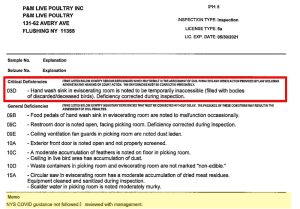
(Documents from New York Department of Agriculture and Markets)
Overcrowding, Feces-Filled Cages, and Other Animal Welfare Issues at Live Animal Markets
Live markets also had documented deficiencies that related to animal welfare — including insufficient light in holding areas, overcrowding, dead birds mixed with live birds, and birds kept in roach-infested and feces-encrusted cages.
State inspectors documented “2-3 dead birds” in the live bird area at Astoria Live Poultry in January 2021. Inspectors also noted live birds on the loose during multiple inspections, as well as a trash- and debris-filled floor and peeling paint in the live bird room, according to the public records.
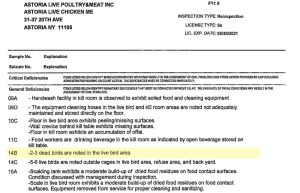
(Documents from New York Department of Agriculture and Markets)
At Canola Live Poultry, inspectors noted loose birds on multiple occasions in an area with soiled walls, peeling surfaces, cobwebs, live flies, and accumulated feces. Inspectors noted multiple birds kept in “soiled” cages at least eight times. During inspections in July and August 2022, inspectors also noted the facility was “roach infested” – with live insects crawling over floors, walls, and live bird cages, with the inspector observing “over 20 live roaches” and 36 dead roaches inside the facility during the inspection.
Inspectors noted live birds in unclean cages during at least 10 inspections at HK Live Poultry, as well as soiled floors and walls, accumulated dirt and feces, peeling paint and chipped tiles, mouse droppings, live flies, and also a live cat, according to public records documents.
Birds were being held in “heavily dropping laden” cages at Macca Poultry, as well as in cages with protruding metal wire, broken locks, and cage doors that were falling off noted during two inspections in 2022. An inspector also noted that workers in the evisceration and kill rooms didn’t have sufficient light for processing activities.
State inspectors documented birds at Halal Live Poultry living above catch pans with accumulated, encrusted filth and feces in a holding area with accumulated feathers and excrement but no adequate ventilation system. A state inspector also spoke with management about adding lighting to the back area of the market where the birds were being housed, according to the public records documents.
State inspectors also noted birds in overcrowded cages multiple times at both Salahi Live Poultry and Bronx River Live Poultry, according to the public records documents.
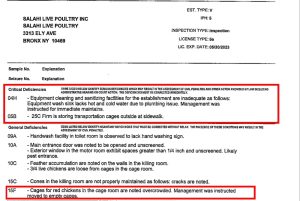
(Documents from New York Department of Agriculture and Markets)
Other Documented Deficiencies
Broken, inaccessible handwashing sinks. No soap. COVID-19 protocols not being followed during the pandemic. Those were just some of the issues state inspectors noted at the New York live markets.
Other deficiencies, according to the public records documents:
- “Pooling red blood-like liquid” in the refuse area, a retail egg cooler not at the proper temperature to “properly cold hold potentially hazardous foods,” a hand wash station without soap in the worker locker and refuse room, mouse droppings, live flies, cockroaches, grime, and stagnant water during inspections at Astoria Live Poultry and Meat
- Accumulated feathers, a broken faucet, peeling paint, soiled transport batteries, “mold-like” matter on a ceiling, standing water, “inedible chicken parts in bowls” on the eviscerating room floor, flies, rodent feces, and cockroaches during inspections at Canola Live Poultry
- Delivery vans with internal temperatures of 43 degrees transporting slaughtered poultry in violation of the market’s license, raw chicken being “dripped onto by water from the tabletop where workers are cleaning other chickens,” accumulated grime near a chicken processing station, food operator towels for “wiping personal sweat” hung above the scalding machine in the kill room, freshly slaughtered chickens in customer bags awaiting pickup stored in a 70-degree walk-in cooler, and slaughtered chickens stored directly on the floor of the kill room where the scalding tank was draining at Macca Live Poultry
- Inadequately sanitized knives, murky water accumulating in damaged surfaces of the killing room floor, accumulated feathers and viscera, feces, flies, cockroaches, gnats, grime, soiled equipment, pooling water, no sanitizing solution in the kill room, and equipment stored in a way that “is a likely insect harborage” during inspections at Halal Live Poultry
- Dark grime, flies, a hand wash station in a killing room with no soap or sanitation drying device, employees not wearing face coverings per the state’s COVID-19 pandemic guidelines, and a build up of dried product residues on food contact surfaces at HK Live Poultry
- A note that NYS COVID guidance was not being followed, a chicken product stored at room temperature, mouse droppings, dried food residues, accumulated feathers and dust at P+M Live Poultry
- Accumulated feathers and viscera, dried residues, live flies and floors in disrepair at Salahi Live Poultry
- Bird catch trays with accumulated feces, floors littered with feathers and viscera, and an improperly maintained blood letting table at Bronx River Live Poultry
If you haven’t already, please sign our petition urging regulatory authorities to thoroughly investigate these markets and shut down any in continued violation of New York’s animal welfare, public health, and safety standards!
SIGN: Stop Animal Suffering and Death in Filthy, Dangerous Live Markets

